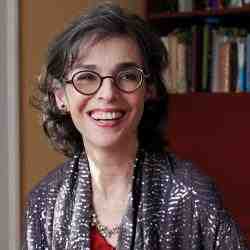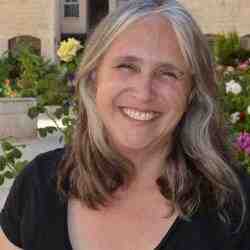MagikMe
https://www.magikme.netIntroduction
Eszter uses playgrounds as a means of building community and turning segregated kindergartens into inclusive places where disabled and non-disabled children can play together, helping both develop into more emphatic, cooperative and tolerant adults.
The New Idea
Aspiring to alleviate social exclusion experienced by families with young disabled children, Eszter co-founded MagikMe, a social venture engaged in the production of inclusive playground equipment, the development and support of local communities, as well as in working with kindergarten teacher training institutions to spread the necessary tools and know-how for inclusive kindergartens.
As playgrounds are essential community spaces in Hungary, she works to transform these popular sceneries to become a vehicle of change towards an inclusive and emphatic society. Eszter envisions integrated communities, where families with disabled children can have an empowering local support network, which has the potential to raise real inclusivity on an institutional level through effective self-advocacy and leading by example. The experience of playing together at playgrounds in early childhood produces a long lasting effect on the socio-emotional development of abled and disabled children alike. Playing together in early childhood also prepares these children to continue to play and work together as they become classmates in kindergartens, thus breaking down biases in the early formative years.
As the awareness about MagikMe has grown in Hungary, more and more kindergarten teachers have reached out to Eszter, inquiring about the possibility of bringing her work to their community. She brings her program to communities where these ‘green light’ people (those who are open to her initiative) are present, as they will become her local ambassadors, enabling the formation of communities and opening up the doors of local kindergartens to those disabled children who would otherwise have to attend segregated kindergartens. The support from local communities, open-minded teachers in kindergartens and tolerant non-disabled peers opens up the system and ultimately creates more inclusive institutions, allowing disabled children to become active members of our society.
Once MagikMe moved abroad in 2020, Eszter continues supporting children with atypical development and social inclusion at Nestingplay.
The Problem
“My name is Anna and my 3-year-old son, Robert has multiple disabilities. We had to move to Debrecen (Hungary’s second largest city) because of my job. As we were settling in, we could not find any integrated playgrounds and really struggled to find a community we could call ours. I also visited several kindergartens and was turned away every time with different excuses. I feel we have nowhere to go!”
Out of over 1 million people with disabilities in Hungary, more than 20,000 families raise young disabled children. The lack of public awareness, ineffective policies and a segregated education has caused life-long isolation for this group of people. Moreover, it cause differently abled children to miss out on integration opportunities in their early years thus kick starting a cycle of continued marginalization. This life-long isolation makes it impossible for them to become contributing members of society and to pursue opportunities that those without differing abilities can easily access. After starting their early years of social interaction in a segregated institution, usually far from their home, with limited resources, there is slight chance to break out.
There is no clear understanding of what a policy of inclusion entails and what role it can play in building a cohesive social environment that creates empathetic citizens willing to collaborate and take responsibility for their community. Because inclusion is not fully understood by the public and segregation persists on various levels, there is little public demand for its advancement, and the government has little initiative to introduce legislative changes, develop financial measures and provide methodological support - despite the recommendations of international bodies
Having few opportunities to interact with others since childhood, it is easy for disabled children to acquire a stigma, inhibiting their personal and professional development. Programs and solutions to reach inclusivity and empathy are mostly beyond childhood, targeting adulthood.
However, there is an emerging wave of communities, policy-makers and educational institutions willing to break this vicious cycle and promote inclusion on a local level. With Eszter gaining more and more visibility, these players are getting to know her work and become her allies. She also identified ‘green-light’ people in the teacher training institutions who want to work on more modern and inclusive teacher training materials and educational tools that will enable Hungary’s new generation of teachers to create a more inclusive environment in their schools.
The Strategy
Eszter has developed a blend of top-down and bottom-up strategies that complement each other in her model. As a first step in her model, she identifies active local ‘ambassadors’ by working closely with existing parent-networks (such as the Bice-bóca network across Hungary), local NGOs and municipalities. Once there is a local core-group, she supports the organic development of this group through consultation, local events with strong emphasis on media coverage, a methodology handbook for forming communities, and the dissemination of best practices on self-advocacy and legal support. She also plugs them into her active social media community of 3000+ people who regularly share best practices, resources and stories. Once the group is strong enough, Eszter decreases her direct involvement and relies more on this peer to peer support to carry on independently from her personal influence. Once a strong supportive community is formed, these families will have the necessary support network behind them to feel empowered and become proactive self-advocates for their rights and interests.
Eszter also provides playground equipment that allows disabled and non-disabled children to play together and thus enjoy the first socializing platform to start the integration process of families with disabled children. Eszter designs and produces this playground equipment to enable children with different kinds of disabilities and non-disabled children to interact directly.
Having these children play together from a very early age also prepares them to collaborate without judgment and accept each other without biases and stigmas. As such, these experiences of ‘free play’ prepare both disabled and non-disabled children to become good classmates in the kindergarten, making way for inclusion. Eszter is strategic in placing her playground equipment into communities with existing interest and in places where she knows of ‘green-light’ kindergarten managers and teachers, people who are open to create a more inclusive environment in their own kindergartens. The increasing integration of children of all abilities at the kindergarten level is providing good examples for Eszter to share with others, and this influences the education system from the bottom up.
These bottom-up efforts are complemented by Eszter’s work with policy-makers to create a supportive education system that openly embraces inclusion. First, Eszter is working with one of the leading teacher training institutions to create tools and methodologies that their students can learn while training to become kindergarten teachers. Having these inclusive tools and skills will enable these teachers to handle mixed groups of students in a proper way. She also teamed up with Ashoka fellow Márta Bácskai who works with all of Hungary’s kindergartens to infuse arts education as a tool to develop essential life-skills. Collectively, they pinpoint the most active institutions in Márta’s network to discuss the possibility of bringing Eszter's methodology to new communities. The idea is that the selected kindergartens are already predisposed to engage with new ways to deal with children.
Eszter is working towards her goals with a mixture of human resources. She has an Ltd (MagikMe) as well as an association. The Ltd is responsible for designing and selling the playground equipment while the association works with local communities and support services. She has two full-time colleagues working directly with her in her LTD. Additional capacity and support is provided by two advisory board members who are working closely with the core team as volunteers. About 10% of her active social media community can also be mobilized as volunteers for specific activities.
Eszter has already flipped over 50 playgrounds to be more inclusive through the placement of her equipment. Moreover, local communities have also started to form around these playgrounds and are in different stages of maturity, ranging from very new groups to more mature and active communities. Her ever-growing Facebook community is also very active and supportive to new and existing community members.
In five years, she will have helped build a network of 500 communities around inclusive playgrounds while reaching over 10,000 families with young disabled children (50% of the primary target group) through a mixture of local programming, communications, networking or access to integrated kindergartens. By the end of 2019, 10 kindergartens will become active institutional partners, having received training and tools to successfully handle integrating disabled children into their groups. Eszter will rely on these early-adopter kindergartens to help spread the work and share their good practices with others. Her training program will become certified, thus counting towards the credit requirement of kindergarten teachers; MagikMe will train 100 kindergarten teachers annually.
Eszter is currently working on incorporating her methodology into a full curriculum at Hungary’s premier teacher training school, the Bárczi Gusztáv Faculty of Special Needs Education. This will result in all graduating kindergarten teachers to be trained in inclusive education of children with varying abilities. Within the next five years, Eszter will also work closely with Hungary’s premier integrated elementary school “Children’s House” to explore ways to expand her methodology in elementary schools. Furthermore, she will have trained 500 kindergarten teachers, opening doors to a more integrated kindergarten education to approximately 1500 disabled children across Hungary. During these five years, Eszter will pro-actively develop her professional network across the region as well in order to find suitable partners for cross-border replication.
The Person
Eszter’s second son, Áron, was six months old when the family learned he was suffering from epilepsy. It was a turning point in her life. She not only had to see him suffer from countless seizures, but also had to face open discrimination. Even though she came from an educated family, she was not equipped to prevent the heartbreaking experience of seeing other children simply leaving Áron out of the fun at the playground, and consequently missing out the first stage of socialization in his life.
Eszter was born into an intellectual middle-class family in Hungary. Her first community experience occurred in her late teens, when she learned about her Jewish roots and stories about her family. That was enough motivation for her to start exploring her Jewish roots. She established a strong network of like-minded peers and became a founding member of a community that was cultivating Jewish culture while serving as a safe space for the community members. It has proved to become a lifelong support structure for Eszter, with many of these friendships remaining in her life even today. The positive experiences she gained from belonging to a community was a fundamental force that helped shape her values and priorities. During her university years, she completed her sociology studies while volunteering with several projects: she supported the integration of Roma communities in the VI district of Budapest and co-hosted a radio program broadcasting interviews with marginalized communities. Volunteering became a constant value in her life, which she continued to pursue even after embarking on a demanding professional career.
She has experienced how her non-disabled son had learned to play together with his disabled sibling while also seeing Áron’s kindergarten peers learn and enjoy playing together with him. These profound observations led her to start her work towards integrated communities. Over the past years, she managed to spread her message nation-wide and beyond Hungary’s borders. Inquiries found her from all over the world, including India and South Korea, among others. She has also received numerous international awards for her work, including the Zero Project award for the best innovative solutions in accessibility in 2018, finalist in the European Investment Bank’s Social Tournament in 2017 and winner of Women’s Entrepreneur of the Year Award by the Visegrad Four in 2018.



